-
Expert questions DHS grants for rural communities following 9/11

In the decade since 9/11, the U.S. government has poured more than $1.3 million into the rural community of Ross County, Ohio, which some argue is a waste of federal resources; the funds were ostensibly designed to prevent terrorism, but much of the money has been spent to bolster emergency response capabilities in the event of a major disaster whether it be natural or manmade
-
-
Libyan rebels attack last Gaddafi strongholds
Anti-Gaddafi rebels have begun what they call an “all-out attack” on Moammar Gaddafi’s hometown of Sirte meeting with fierce resistance; at the same time, rebels have mounted an offensive against Bani Walid, where their advance has been stalled; in the deep southern desert, rebels have captured and air force base and two nearby towns
-
-
St. Andrews University promoting its certificate in terrorism studies

The University of St. Andrews is promoting a program leading to a certificate in it terrorism studies; the program was established in 2006 in is offered on-line
-
-
More than $2.1 billion in DHS preparedness grants announced
DHS announced the final allocation for twelve preparedness grant programs totaling more than $2.1 billion in federal grants; DHS grants were reduced by $780 million for the FY 2010 enacted level, nearly a quarter of FY 2010 DHS grant funding
-
-
Two radiation generators help protect U.S.

One aspect of a nuclear explosion— the electro-magnetic pulse, or EMP — was much discussed during the cold war: scientists argued that exploding a nuclear bomb in the skies high above the United States would create an EMP which would disrupt electronic equipment and paralyze the nation; two remarkable pulsed-power machines used to test the U.S. defenses against atomic weapons have surpassed milestones at Sandia National Laboratories
-
-
Budget cuts could hurt biodefense efforts
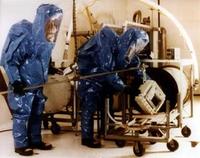
With lawmakers struggling to reduce spending and cut the deficit, funding for government programs aimed at thwarting biological threats could face severe budget cuts; while the budget for overall civilian biodefense increased by 17 percent, that number is deceiving as federal agencies consolidated and combined several key programs under larger budget line item headings
-
-
NYPD remains on high-alert following 9/11
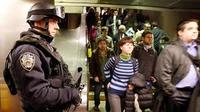
Officials in New York remain on high-alert following the warning issued by DHS that terrorists might be plotting an attack on the city for the ten-year anniversary of 9/11; NYPD have pulled back the additional security measures put in place for the ten-year anniversary like checkpoints at ports of entry and bridges, but remain on vigilant for a potential bomb attack
-
-
Natural disasters stretch NGO relief teams to the limit
The recent spate of natural disaster has stretched the nation’s third largest NGO disaster relief program to the limit; in the last several months, the Southern Baptist Convention (SBC) has sent more than 3,300 volunteers to five natural disasters across the United States
-
-
Combating the financing of terrorism
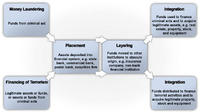
Terrorist organizations rely on financing and support networks to sustain operations and launch attacks. The U.S. Department of the Treasury has developed a sophisticated and comprehensive approach to identify, disrupt, and deter the funding networks of terrorist organizations
-
-
Supreme Court to rule on age of "Big Brother" surveillance

This November the Supreme Court is gearing up to hear a landmark case which will decide how far law enforcement agencies can pry into an individual’s private life; federal judges argue that the use of GPS surveillance by law enforcement is an “Orwellian intrusion” into private life and violate the Fourth Amendment; meanwhile police say GPS tracking is simply a more efficient way to tail a suspect’s car or track their movements, things they can currently do without a warrant
-
-
Pakistani man attempted to ship nuke materials to home country
Last Friday, a Pakistani man pleaded guilty for conspiring to ship nuclear materials to individuals with alleged ties to his country’s government
-
-
Parking attendants part of U.S. anti-terrorism effort
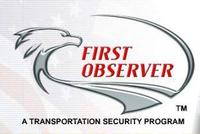
More than 7,000 parking professionals have been trained in the First Observer parking-specific program developed by the International Parking Institute with the DHS and the Transportation Security Administration
-
-
Most Americans unprepared for disaster, survey finds
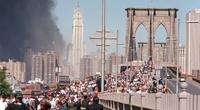
A new survey finds that most Americans are unprepared for major disasters and that they maintain a false sense of security with regard to what will happen if a major disaster or a terrorist attack took place; contrary to reality, almost one-third of respondents believed that during a major disaster, calling 911 would bring help within an hour, while 30 percent said they believed help would come within several hours
-
-
Emergency cleanup plans for potential Cuban oil spill
With Cuba set to begin offshore drilling, the former head of the Environmental Protection Agency (EPA) is pressing the United States to immediately begin developing emergency plans to assist Cuba in the event of a major oil spill
-
-
9/11 legacy: more resilient skyscrapers

Following the 9/11 attacks on the Twin Towers in New York, many predicted that the age of the skyscraper was over; there has been no slowdown in skyscraper orders, however — but the skyscrapers being built today are much stronger than the Twin Towers were; new materials, innovative designs, and attention to safety make today’s skyscraper much more resilient to man-made and natural disasters
-
More headlines
The long view
Factories First: Winning the Drone War Before It Starts
Wars are won by factories before they are won on the battlefield,Martin C. Feldmann writes, noting that the United States lacks the manufacturing depth for the coming drone age. Rectifying this situation “will take far more than procurement tweaks,” Feldmann writes. “It demands a national-level, wartime-scale industrial mobilization.”
No Nation Is an Island: The Dangers of Modern U.S. Isolationism
The resurgence of isolationist sentiment in American politics is understandable but misguided. While the desire to refocus on domestic renewal is justified, retreating from the world will not bring the security, prosperity, or sovereignty that its proponents promise. On the contrary, it invites instability, diminishes U.S. influence, and erodes the democratic order the U.S. helped forge.
Fragmented by Design: USAID’s Dismantling and the Future of American Foreign Aid
The Trump administration launched an aggressive restructuring of U.S. foreign aid, effectively dismantling the United States Agency for International Development (USAID). The humanitarian and geopolitical fallout of the demise of USAID includes shuttered clinics, destroyed food aid, and China’s growing influence in the global south. This new era of American soft power will determine how, and whether, the U.S. continues to lead in global development.
Water Wars: A Historic Agreement Between Mexico and US Is Ramping Up Border Tension
As climate change drives rising temperatures and changes in rainfall, Mexico and the US are in the middle of a conflict over water, putting an additional strain on their relationship. Partly due to constant droughts, Mexico has struggled to maintain its water deliveries for much of the last 25 years, deliveries to which it is obligated by a 1944 water-sharing agreement between the two countries.
How Disastrous Was the Trump-Putin Meeting?
In Alaska, Trump got played by Putin. Therefore, Steven Pifer writes, the European leaders and Zelensky have to “diplomatically offer suggestions to walk Trump back from a position that he does not appear to understand would be bad for Ukraine, bad for Europe, and bad for American interests. And they have to do so without setting off an explosion that could disrupt U.S.-Ukrainian and U.S.-European relations—all to the delight of Putin and the Kremlin.”
How Male Grievance Fuels Radicalization and Extremist Violence
Social extremism is evolving in reach and form. While traditional racial supremacy ideologies remain, contemporary movements are now often fueled by something more personal and emotionally resonant: male grievance.
